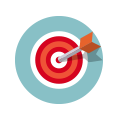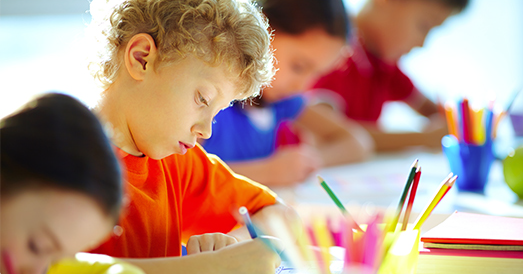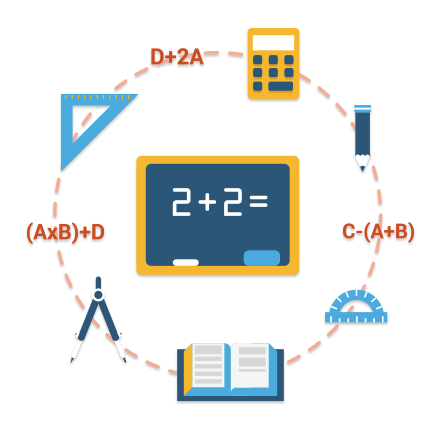Year 9 Maths
The final part of Key Stage 3 mathematics is completed during Year 9 maths. During this final learning stage, you will learn how to use scientific notation, in particular, scientific notation with larger numbers, smaller number and how to change scientific notations to numerals. One of the other key procedures and formulae within Key Stage 3 mathematics is the Pythagoras theorem. You will learn how to find the hypotenuse, Pythagorean triples and calculating a leg of a right-angled triangle. You will also develop your knowledge of geometry, you will study geometry-constructions which will include; angle bisector construction and its properties, circumcentre and incentre and orthocentre and centroids. Once you have completed Key Stage 3 mathematics you will be fully prepared to move onto Key Stage 4 mathematics which will take you towards your key GCSE maths examinations during Foundation Mathematics and Higher Mathematics.
.Popular Maths Curriculum Courses in England.
Key Stage 4
Foundation Maths
Experimental probability, relative frequency, equations involving grouping symbols are some of the areas taught in Foundation Maths.
Key Stage 4
Higher Mathematics
At Higher Mathematics you will be taught surds, surface are formulae and you will also be introduced to circle geometry.
Key Stage 5
Core Mathematics
You will learn algebra-polynomials, polynomial equations, the remainder theorem, absolute value and roots quad equations.
Key Stage 5
Statistics Mathematics
Your studies at this stage will comprise of grouped data, range and dispersion, standard deviation and general statistic probability.



KS 3 Maths Topics
#
TOPIC
TITLE
1
Number problems
Problems with numbers.
Objective: On completion of the lesson the student will be able to solve problems with numbers using a problem solving strategy.
2
Money
Problems involving money
Objective: On completion of the lesson the student will be able to solve problems with money.
3
Fractions
Comparing and ordering fractions
Objective: On completion of the lesson the student will be able to compare and order fractions with the same number of equal parts, and compare and order fractions with a different number of equal parts.
4
Fractions
Comparing and ordering fractions greater than (>) 1
Objective: On completion of the lesson the student will be able to use diagrams, number lines and equivalent fractions to compare and order fractions greater than (>) one.
5
Fractions
Adding and subtracting fractions with different denominators
Objective: On completion of the lesson the student will be able to add and subtract fractions where one denominator is a multiple of the other.
6
Fractions
Multiplying fractions by whole numbers
Objective: On completion of the lesson the student will be able to multiply simple fractions by whole numbers.
7
Fractions
Fractions of whole numbers
Objective: On completion of the lesson the student will be able to calculate unit fractions of a collection.
8
Fractions
Multiplying fractions
Objective: On completion of the lesson the student will be able to multiply fractions and reduce the answer to its lowest form.
9
Fractions
Multiplying mixed numbers (mixed numerals)
Objective: On completion of the lesson the student will be able to multiply mixed numbers (mixed numerals) and reduce the answer to its lowest form.
10
Fractions
Finding reciprocals of fractions and mixed numbers (mixed numerals)
Objective: On completion of the lesson the student will be able to find the reciprocals of fractions and mixed numbers (mixed numerals).
| # | TOPIC | TITLE | |
|---|---|---|---|
| 1 | Number problems | Problems with numbers. | |
| Objective: On completion of the lesson the student will be able to solve problems with numbers using a problem solving strategy. | |||
| 2 | Money | Problems involving money | |
| Objective: On completion of the lesson the student will be able to solve problems with money. | |||
| 3 | Fractions | Comparing and ordering fractions | |
| Objective: On completion of the lesson the student will be able to compare and order fractions with the same number of equal parts, and compare and order fractions with a different number of equal parts. | |||
| 4 | Fractions | Comparing and ordering fractions greater than (>) 1 | |
| Objective: On completion of the lesson the student will be able to use diagrams, number lines and equivalent fractions to compare and order fractions greater than (>) one. | |||
| 5 | Fractions | Adding and subtracting fractions with different denominators | |
| Objective: On completion of the lesson the student will be able to add and subtract fractions where one denominator is a multiple of the other. | |||
| 6 | Fractions | Multiplying fractions by whole numbers | |
| Objective: On completion of the lesson the student will be able to multiply simple fractions by whole numbers. | |||
| 7 | Fractions | Fractions of whole numbers | |
| Objective: On completion of the lesson the student will be able to calculate unit fractions of a collection. | |||
| 8 | Fractions | Multiplying fractions | |
| Objective: On completion of the lesson the student will be able to multiply fractions and reduce the answer to its lowest form. | |||
| 9 | Fractions | Multiplying mixed numbers (mixed numerals) | |
| Objective: On completion of the lesson the student will be able to multiply mixed numbers (mixed numerals) and reduce the answer to its lowest form. | |||
| 10 | Fractions | Finding reciprocals of fractions and mixed numbers (mixed numerals) | |
| Objective: On completion of the lesson the student will be able to find the reciprocals of fractions and mixed numbers (mixed numerals). | |||
See More Topics Covered in Year 9 Key Stage 3 Maths
..









